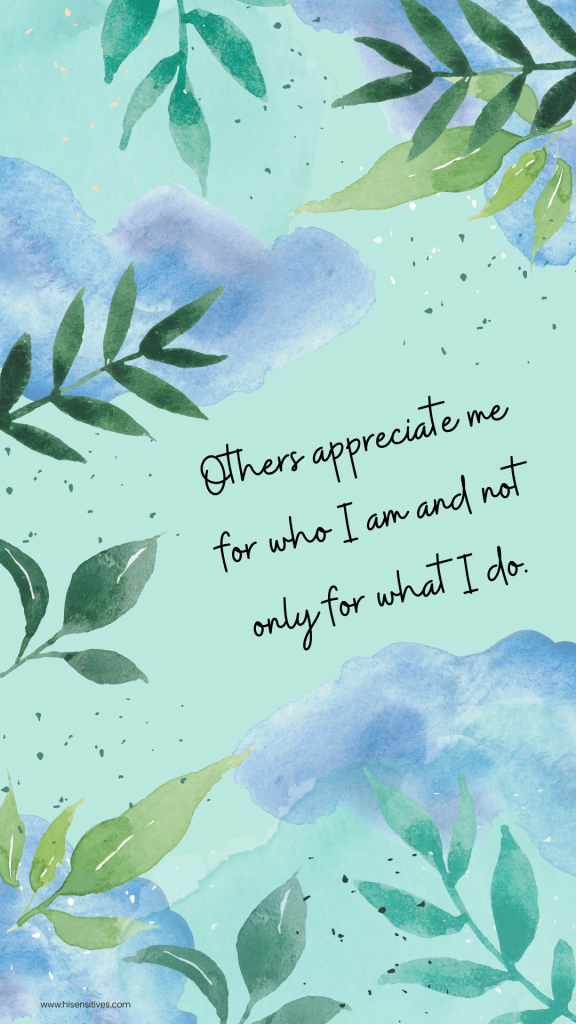Do you struggle with people walking all over you? Is it common for you to put your own needs aside to please others? The chances are likely that you are a people-pleaser. Here are ways to stop being a people-pleaser and learn how to put yourself first!
Estimated reading time: 1 minute
For as long as I can remember, people told me that I am too nice. That I am too kind and soft for this world. That I have to watch out for others, because the world can be brutal.
Back when I was a child, I wasn’t aware of my HSP trait and the fact that I am an empath. I simply knew that I felt everything and cared deeply.
Nothing could stop me from being a people-pleaser. At least it felt that way. I thought that by stopping with people-pleasing, I’d be selfish or rude.
However, many tough lessons came forth from my people-pleasing behavior. Heartaches, low self-esteem and a decrease in self-respect were some of the consequences I had to deal with after people-pleasing for years.
Hence, I knew that something had to change. About 7 years ago, I chose a different path in order to live a more authentic, self-loving and peaceful life. By waving people-pleasing good-bye, I learned how to love myself.
In this article, I’ll share my top 10 secrets on how you can stop people-pleasing and embrace yourself.
Here’s What You’ll Learn
- What Is People-Pleasing?
- Why You Should Stop With People-Pleasing
- Common Signs That You Are A People-Pleaser
- How To Stop Being A People-Pleaser
- #1 Stop Being A People-Pleaser By Validating Yourself
- #2 Practice Setting Boundaries
- #3 Be Clear About Your Own Motives
- #4 Don’t Offer Help Unless You’re Being Asked
- #5 Ask A Friend To Support You In Your Journey
- #6 Learn More About Conflict Resolution
- #7 Practice Self-Love To Stop Being A People Pleaser
- #8 Stop Over-Explaining Yourself
- #9 Set Time Limits
- #10 Examine Who You Want To Help Out
- Do You Want To Connect With Fellow Sensitive Souls?
What Is People-Pleasing?
People-pleasing entails putting other people’s needs above one’s own in order to help them, make them feel happier or to improve the relationship. This people-pleasing is challenging to stop with, as it often is a result of codependency and trauma.
People-pleasing is a common struggle many highly sensitive people and empaths experience. Their sensitive nature automatically attunes to the needs of others. Due to their increased amount of empathy, they may feel responsible for helping out others, as they feel deeply what the other person is going through.
This people-pleasing behavior may occur within your marriage, friendships, at work or even for random strangers in extreme cases. While it is good to be kind and helpful, it is important to know the boundaries of helping others. After all, it should not be at the cost of your own well-being.
Why You Should Stop With People-Pleasing
There are multiple reasons why you should consider stopping with people-pleasing. First of all, chronic people-pleasing may take its toll on your physical health. You may be so eager to help out others, that you forget to take care of yourself and end up feeling burned out.
Secondly, people-pleasing harms your mental health in the long run. It deeply affects your level of self-worth, self-esteem and self-respect. Especially when you find yourself in a situation where others benefit from your kindness, but you never get anything in return, it can truly affect your overall well-being.
Finally, people-pleasing behavior provides people around you with the idea that you have no boundaries. They are aware of the fact that you won’t say no and will therefore use your skills, kindness and capacity as often as they can and need.
Common Signs That You Are A People-Pleaser
You may wonder whether you are struggling with the ‘people-pleasing syndrome’. Below are some common signs of a people-pleaser:
Low self-esteem: People pleasing is oftentimes associated with low self-esteem. People-pleasers feel deeply insecure on the inside and seek validation externally through helping and supporting others.
Over-apologizing: Another common symptom of people-pleasing is over-apologizing. Oftentimes, you may find yourself apologizing for the most simple things (that don’t even need an apology).
No boundaries: You may have a hard time setting boundaries and ‘no’ is a word you hardly use towards others.
Not speaking up for yourself: As a people-pleaser, you often may find yourself in situations where you disagree with someone, but don’t speak up for yourself. You don’t want to cause trouble for the other person and therefore choose to agree with them instead.
Disconnected from your own feelings: Oftentimes, people-pleasers find it challenging to understand and listen to their own feelings and needs. As they always attune to the needs of others, their own voice within is very silent.
Strong desire to be liked: People-pleasers find it very important to be liked by others. Therefore, they experience great distress when somebody dislikes them, as it confirms how they feel on the inside.
Conflict-avoidant: People-pleasers want to stop conflicts as quickly as possible, as they experience discomfort when conflict or arguments arise.
How To Stop Being A People-Pleaser
Do you identify as a people-pleaser? Let’s have a look at 10 powerful ways to stop being a people-pleaser and start healing your people-pleasing behaviors:

#1 Stop Being A People-Pleaser By Validating Yourself
As mentioned, people-pleasers oftentimes increase their self-esteem by seeking validation from the outside. This is also the reason why it is so hard to stop being a people-pleaser. After all, by doing so, the source of validation disappears.
Therefore, the first step towards reducing people-pleasing behaviors, is to start validating yourself. For instance, by using self-affirmation statements like these ones:
“I am loved, even if I choose to take care of myself today”
“I appreciate my life, myself and my talents.”
“Others appreciate me for who I am and not only for what I do”
“I love myself”
You can use these self-affirmations throughout your day and remind yourself by putting them on your mirror or adding them as a wallpaper to your phone.
Additionally, you may want to have a look at this awesome card deck with affirmation cards: ‘Affirmators! 50 Affirmation Cards to Help You Help Yourself – Without The Self-Helpy-Ness!’
#2 Practice Setting Boundaries
Another method I found powerful in the process of learning how to stop being a people-pleaser, was to practice setting boundaries. For this, I examined all the moments in my life where I would people-please.
I wrote them down on paper and rated them on a scale from 1 to 10, where 1 is the lowest effort and 10 is high effort. Then I waited for a similar ‘low effort situation’ to pop up in my life and set a boundary by declining. It is easier to set a boundary regarding a small effort compared to declining a big favour.
After each success moment, I’d write down how I felt after setting the boundary and tune into my body and its energy. Becoming more conscious of the effect of setting boundaries on my own well-being helped me in setting more boundaries later on.
By slowly building up your boundaries step by step, you will grow as a person and soon learn how to stop being a people-pleaser. The book ‘Set Boundaries, Find Peace‘ may help you with that!
#3 Be Clear About Your Own Motives
If you think about it for a second, it can actually be quite selfish to help others solely for self-validation. In fact, you should only help others when you do it from the motive of helping them out without seeking after any additional benefits for yourself (and your self-worth). Helping others should always come from a place of compassion, empathy and love.
This was something I didn’t like to hear when I first began my journey towards stopping with people-pleasing. I thought that I did this already, but after critically looking at myself, I realized that I agreed to many things because of my codependent, people-pleasing, insecure nature. For me, it was a way to validate my self-worth, which in fact is quite selfish.
Therefore, I advise you to critically look at your own intentions behind helping others out. Do you help others to gain something out of it yourself? If your answer is yes, ask yourself if you want to continue helping others from that intention. For me, it was clear that I had some work to do in terms of increasing my self-worth and self-love.
#4 Don’t Offer Help Unless You’re Being Asked
People-pleasers often tend to offer help whenever they pick up signals that help is needed. Whether it are verbal or non-verbal signals: the people-pleaser will come to the rescue!
However, that is where you could take a step back. Try to agree with yourself that you will only help others when they directly ask you for it. You may be shocked how many chores you took on in the past by initiating them yourself.
Therefore, lean back, wait for the invitation and use the extra time on your hands to do something for yourself.
#5 Ask A Friend To Support You In Your Journey
Oftentimes we are not aware of our people-pleasing behaviors. It can be hard to point out when exactly you are doing or saying things that relate to people-pleasing.
Therefore, ask a good friend to point out your people-pleasing behaviors when they occur. For instance, my sister brought it to my attention that I apologize a lot even when it is not necessary. We agreed that she’d point out my apologizing behavior whenever she noticed it.
The first few times we were calling each other, she’d point it out approximately 10-15 times in one conversation. However, as the months flew by, my apologies decreased. At one point, she eventually said that she noticed a great difference in my people-pleasing behavior, which is awesome!
Having a friend or family member support you when you want to stop being a people-pleaser is a great way to quickly become aware of your behaviors.
#6 Learn More About Conflict Resolution
Another valuable technique to stop people pleasing, is to learn more about conflict resolution. As people-pleasers oftentimes are conflict-avoidant, this is one of the biggest barriers they have to overcome in order to reduce people-pleasing.
Therefore, it is wise to learn how you effectively can resolute a conflict while still standing up for yourself and your own needs. This way, you will manage to handle conflicts better and feel confident while doing so.
There are many different communication courses and experts who may help you with this challenge. However, you may want to consider reading the book ‘The Mindful Guide to Conflict Resolution: How to Thoughtfully Handle Difficult Situations, Conversations, and Personalities’. This book helps you to gracefully and thoughtfully handle challenging situations and different types of people.
#7 Practice Self-Love To Stop Being A People Pleaser
People-pleasers often leave no room for self-love in their schedule. They are so focused on their outside environment and finding the validation there, that they forget the most important source for increasing one’s self-esteem: oneself.
Therefore, you may want to start scheduling moments of self-love in your calendar. Treat these moments as you would treat appointments with others. This way, you ensure to always take good care of yourself.
In the beginning, it may feel challenging for you to decline helping someone out because you already scheduled time for yourself. However, please remember that you cannot pour from an empty cup. You need this time for yourself, so take it.
#8 Stop Over-Explaining Yourself
Another common thing you as a people-pleaser should consider to stop with, is to over-explain yourself. When you decline a request from somebody else, try to keep it as short and firm as possible.
The longer you formulate your explanation for why you can’t help somebody out, the more room you leave for them to convince you to help them anyways.
A simple, short declination is enough to tell the person that you cannot help them. “As much as I would have loved to help you, I won’t be able to do so this time” should be enough. And if the person asks why, simply reply “I don’t have the capacity to help you out this time”.
It feels harsh, especially when you are still in the beginning stage of learning to stop being a people-pleaser. However, as you create more firm boundaries for yourself, this will become easier.
#9 Set Time Limits
What may help you in reducing people-pleasing behavior, is to start setting time limits. Write down how often per week you’d like to schedule time to help others or meet others. Also, determine how much time you want to have for yourself each week.
When somebody asks you for a favor or to meet up, have a look at your time limits and see if it fits within your schedule. If not, let the person know that you’d love to help them out, but that you do not have time at this point.
This way, you show that you hold space for them at a later moment, but don’t over-schedule yourself with helping others out.
#10 Examine Who You Want To Help Out
Finally, you should be critical about the people you want to help out frequently. Most likely, you currently help out everybody who asks; your spouse, your friends, family, co-worker or maybe even strangers on the street.
Try to determine the characteristics of people you want to support. What are some of the criteria that they should meet? Should they be empathic? Kind? Caring? Respectful?
Once you determine the criteria of the people you want to help out, it will be easier to say no to those who you don’t want to help anymore. People-pleasers oftentimes attract toxic people who benefit from their kindness. By setting these criteria, you filter them out.
Do You Want To Connect With Fellow Sensitive Souls?
Would you like to connect with fellow sensitive souls, who may be struggling with people pleasing or other personal growth challenges? Join our membership for highly sensitive people and empaths! Here, we share our interest for personal growth with each other and help each other to grow!
We can’t wait to welcome you there:






